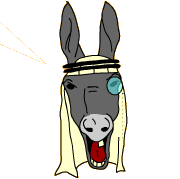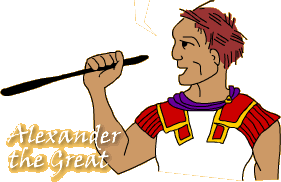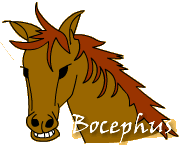
Dudes, I'd like you to meet my friend Alexander the Great, a Macedonian king from the 4th century BCE, and a major player in world history and the Bible.

Macedonian?!? I once knew a three-legged Macedonian donkey whose breath smelled perpetually like onions. What makes you so great?
Maybe it's because I conquered Greece, Egypt, and the Persian Empire before my 33rd birthday. Or maybe it's because I had a great teacher, Aristotle, who himself was taught by Plato, Socrates' student. Or maybe it's because across the Near East my conquests spread Hellenism, the best of Greek ideals, culture, thought, and language. After all, it's ultimately because of me and Hellenism that the Apocryphal books are recorded in Greek.



If you're so great and smart,
then why don't you call it
Greekenism?

My darling, while the Romans called their neighboring country Graecia after one of its tribes, Greeks refer to their country as Hellas, named after their beautiful ancestor Helen. And as for my dear Alexander, I think you are indeed great because of all of the things you mentioned, as well as one other factor: that handsome hunk of a horse of yours, Bocephus.

Thanks for the compliment Cleopatra. Your stunning beauty, eloquence, and charm remind me of the first camel I ever saw. That was way back in 332 BCE, when I carried Alexander on my back all the way into Jerusalem. We saw thousands of people lined up in white garments, chanting "Hail Alexander."

And after a long procession we came to Jerusalem's high priest, wearing an extravagant purple and scarlet outfit, and more importantly, a hat-the same hat I'd dreamed of years before. I had a vision that a priest wearing such a hat would help me to defeat the Persian Empire. With the priest's direction, I sacrificed to the Jewish God at the Temple in Jerusalem, and to my delight, they showed me passages from the biblical book Daniel which prophesied that one day a Greek, such as myself, would conquer Persia. And that's just what happened!

Amidst all the gala during the sacrifice my eyes happened upon what I thought was the sexiest, lippiest, and curviest horse I had ever seen. I had a chance to chat with the creature, who of course turned out to be a camel, almost as lovely as you Cleopatra. This Jerusalem camel taught me all about Judaism during the Diaspora, but it has been so many years I forget exactly what Diaspora means. Can you help me BibleDudes?

Certainly Bocephus. Diaspora is a Greek word that means dispersion, and this refers to the time period after Babylon conquered Jerusalem in 586 BCE, a time when most Jews lived outside of Judah in exile. During the Diaspora, Judaism thrived, especially in centers such as Babylon, but they constantly encountered the threat of assimilation. Thus, many stories in the Apocrypha tell of Jews facing serious threats to their Jewish culture.

With no offense to our fabulous guests Alexander and Bocephus, enough of the background ... Let's learn a bit about these fascinating Apocryphal books, starting with First and Second Esdras, two amazing tales-one of history, one of mysteries pertaining to the end of the world.